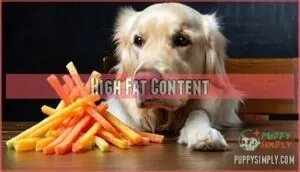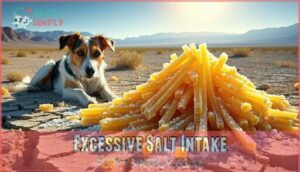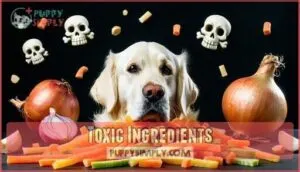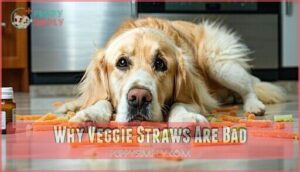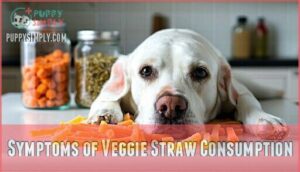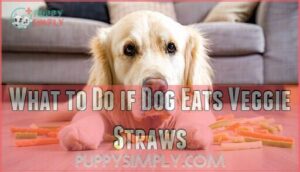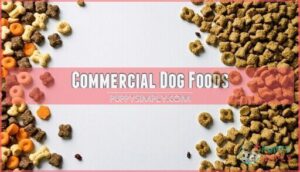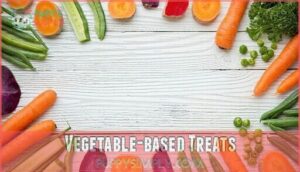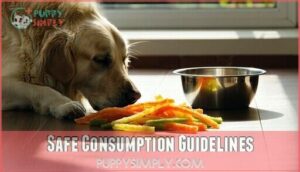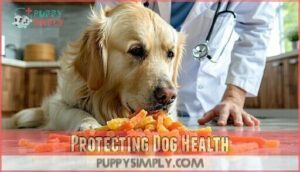This site is supported by our readers. We may earn a commission, at no cost to you, if you purchase through links.
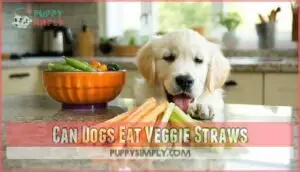
These crunchy snacks contain onion and garlic powder, which are toxic to dogs and can damage their red blood cells. The high salt content can also cause problems like excessive thirst and stomach upset.
While your pup might give you those irresistible puppy eyes, veggie straws pack too much sodium and artificial ingredients for their system to handle safely. Think of it as junk food that’s dressed up to look healthy.
Instead, offer dog-safe vegetables like carrots or green beans. There are specific signs you’ll want to watch for if your furry friend accidentally gets into your stash, which can be a serious health risk and require immediate attention to prevent long-term damage.
Table Of Contents
- Key Takeaways
- What Are Veggie Straws
- Can Dogs Eat Veggie Straws
- Health Risks for Dogs
- Why Veggie Straws Are Bad
- Symptoms of Veggie Straw Consumption
- What to Do if Dog Eats Veggie Straws
- Healthy Alternatives to Veggie Straws
- Safe Consumption Guidelines
- Protecting Dog Health
- Frequently Asked Questions (FAQs)
- What happens if my dog eats a veggie straw?
- Can dogs eat vegetable chips?
- Are veggie straws OK to eat?
- Can dogs have veggie puffs?
- Are veggie straws an appropriate snack for puppies?
- Can veggie straws be used as a training treat for dogs?
- Are veggie straws a good snack for overweight dogs?
- Are veggie straws suitable for dogs with allergies?
- Are veggie straws safe for puppies?
- Can diabetic dogs eat veggie straws?
- Conclusion
Key Takeaways
- Don’t give your dog veggie straws – they contain toxic onion and garlic powder that damages red blood cells and causes anemia, plus excessive salt that leads to dehydration and kidney problems.
- Watch for serious symptoms if your dog accidentally eats veggie straws – vomiting, diarrhea, lethargy, and pale gums can appear within hours and require immediate veterinary attention.
- Choose safe alternatives instead – offer your dog fresh carrots, green beans, or commercial dog treats that provide actual nutrition without harmful processed ingredients and artificial additives.
- Read ingredient labels carefully – many "healthy" human snacks contain hidden dangers for dogs, so stick to foods specifically formulated for canine consumption to protect your pet’s long-term health.
What Are Veggie Straws
You’ve probably seen those colorful, crispy veggie straws in the snack aisle that look like healthy alternatives to regular chips.
These processed snacks are made from potato flour, corn starch, and vegetable powders, then deep-fried in oil and often flavored with salt, spices, or artificial additives, which can be a concern for those seeking a truly healthy option.
Composition and Ingredients
Despite their name, veggie straws aren’t as wholesome as they appear.
These colorful snacks contain potato flour, corn starch, and vegetable powders, but they’re more like potato chips than actual vegetables.
Main Ingredients that concern dog owners:
- Potato starch and flour – high in carbohydrates with minimal nutrition
- Harmful seasonings like salt, onion powder, and garlic powder
- Artificial additives including Red 40 and preservatives
- Deep-frying oils that boost calorie content substantially
- Vegetable powders providing negligible nutritional value despite colorful appearance
Manufacturing Process
Understanding how veggie straws are made helps you see why they’re problematic for dogs.
The manufacturing process involves several steps that transform simple ingredients into highly processed snacks.
| Manufacturing Stage | Process Description | Impact on Dogs |
|---|---|---|
| Extrusion Process | Potato flour and corn starch mixed into dough | Creates dense, hard-to-digest base |
| Deep Frying | Extruded shapes fried in hot oil | Adds unhealthy fats causing pancreatitis |
| Seasoning Application | Salt and flavor powders applied | Introduces toxic ingredients like onion powder |
| Quality Control | Final inspection and packaging | Doesn’t address pet safety concerns |
| Ingredient Sourcing | Raw materials gathered from suppliers | Often includes dog-toxic seasonings |
This multi-step process removes nutritional value while adding harmful elements that make veggie straws unsuitable for canine consumption.
Flavor Varieties
You’ll find veggie straws in several tempting flavors that pose different risks for your dog.
Ranch Veggie Straws contain harmful seasonings, while Spicy Straw Dangers include irritating peppers.
Cheese Flavor Risks involve excessive sodium, and Onion/Garlic Flavors are downright toxic.
These artificial additives make flavored varieties more dangerous than plain snacks, offering zero nutritional value compared to proper dog treats.
Can Dogs Eat Veggie Straws
Veggie straws might seem like a harmless snack-sharing moment with your furry friend, but the answer isn’t straightforward.
While veggie straws aren’t immediately toxic to dogs, they’re not safe either.
These processed snacks contain ingredients that can harm your pet’s health over time.
Most veggie straws dogs encounter contain onion or garlic powder, which are toxic foods for dogs.
Even small amounts can damage red blood cells and cause anemia.
The high salt content poses another risk, especially for smaller breeds where puppy risks are magnified.
Can dogs have veggie straws occasionally?
It’s best to avoid them entirely.
Are veggie straws safe for dogs?
No, due to their processed nature and harmful additives.
Instead, focus on safe vegetables like carrots or green beans as straw alternatives.
Treat moderation applies to all snacks, but with veggie straws, complete avoidance protects your dog’s health.
When in doubt, vet importance can’t be overstated for guidance.
Health Risks for Dogs
While veggie straws might seem like a harmless snack for your dog, they contain several ingredients that can harm your pet’s health.
These processed snacks are high in fat, salt, and often include toxic ingredients like onion or garlic powder that can cause serious problems for dogs.
High Fat Content
Fat content in veggie straws packs a serious punch for your dog’s health.
With 7 grams per serving, these processed foods can trigger pancreatitis, causing severe belly pain and vomiting.
The calorie density contributes to obesity concerns, while heart health suffers from excessive fat intake.
Your pup’s digestive system wasn’t designed for these fatty snacks.
Excessive Salt Intake
Consuming just one serving of veggie straws delivers 220mg of sodium—exceeding most dogs’ daily safe limits.
This excessive salt intake triggers dehydration risks and potential kidney damage.
Small dogs face heightened sodium toxicity concerns, while hypernatremia effects can cause serious complications.
Even a few straws surpass recommended boundaries, making salt poisoning a real threat requiring immediate attention.
Toxic Ingredients
Beyond salt toxicity, veggie straws contain ingredients that pose serious onion toxicity and garlic dangers to your dog.
These snacks often include onion and garlic powder, which damage red blood cells and cause anemia.
Spinach risks arise from oxalic acid that blocks nutrient absorption.
Artificial additives and harmful preservatives in veggie straws can trigger allergic reactions and digestive problems.
Why Veggie Straws Are Bad
You shouldn’t give your dog veggie straws because they contain toxic ingredients like onion and garlic powder that can damage your pet’s red blood cells and cause serious health problems.
These processed snacks also pack high amounts of salt and unhealthy fats that can lead to kidney issues, pancreatitis, and obesity in dogs.
Harmful Effects of Onion Powder
Onion powder packs a toxic punch that’s more dangerous than fresh onions for your furry friend.
Even small amounts trigger organosulfoxides, which attack red blood cells and cause severe anemia risk.
Are veggie straws safe for dogs when they contain this ingredient? Absolutely not.
The toxicity levels can lead to gastroenteritis, making veggie straws dogs should never consume.
Garlic Powder Toxicity
Garlic powder in veggie straws poses serious anemia risk for your dog.
These organosulfoxides effects damage red blood cells, creating toxic dose concerns even in small amounts.
When dogs consume garlic powder, their bodies can’t process these compounds safely.
Are veggie straws safe for dogs? Absolutely not when garlic’s involved.
Immediate veterinary intervention becomes necessary if toxicity symptoms appear.
Spinach Powder Risks
Spinach powder in veggie straw ingredients contains high levels of oxalic acid, which blocks mineral absorption in dogs.
This compound prevents your dog’s body from properly using calcium and magnesium, potentially leading to kidney damage over time.
While spinach seems healthy, its concentrated form creates nutritional impact issues.
Consider safe alternatives like plain carrots for better dog health without toxicity risks.
Symptoms of Veggie Straw Consumption
If your dog snacks on veggie straws, you’ll need to watch for several warning signs that can appear within hours or develop over time.
These symptoms range from mild stomach upset to serious health problems, depending on how many straws your pup ate and which harmful ingredients they contained.
Immediate Symptoms
After your dog munches on veggie straws, watch for vomiting signs within hours.
Diarrhea watch becomes critical as their stomach rebels against processed ingredients. Dehydration risks spike when nausea alert kicks in.
You’ll notice upset stomach symptoms like restlessness and drooling. Some pups show difficulty walking from discomfort.
These immediate reactions signal their body’s rejecting the unhealthy snack, leading to a potential health crisis that requires close monitoring for signs of dehydration risks.
Long-term Effects
Regular veggie straw consumption gradually wreaks havoc on your dog’s body.
Organ damage becomes inevitable as kidneys struggle with excessive salt, while chronic illnesses like dilated cardiomyopathy develop from poor dietary impact.
Heart disease and anemia silently progress, creating behavioral issues as your pet feels increasingly unwell.
These dog health risks can reduce lifespan substantially.
Behavioral Changes
Beyond immediate stomach upset, you’ll notice concerning shifts in your dog’s behavior after eating veggie straws.
Lethargy signs become obvious as your pup loses interest in playtime. Exercise aversion develops, with walking difficulty making simple strolls a struggle.
Irritability may surface alongside appetite changes. These behavioral red flags signal that dogs and veggie straws don’t mix well together, indicating a need to watch for lethargy signs and appetite changes.
What to Do if Dog Eats Veggie Straws
If your dog has eaten veggie straws, don’t panic but act quickly to check how much they consumed and what flavor they ate.
Stay calm, assess the situation quickly, and check ingredients for toxic seasonings like onion or garlic powder.
You’ll need to monitor them closely for symptoms like vomiting or lethargy, and contact your vet immediately if the straws contained onion or garlic powder.
Emergency Care
When your dog snatches veggie straws, quick action matters most. Start by staying calm and assess the situation systematically.
- Evaluate amount consumed and check flavors for toxic ingredients like onion or garlic
- Monitor breathing and watch for choking or allergic reactions immediately
- Contact vet if symptoms appear or large quantities were eaten
- Offer water to help flush excess salt from their system
Emergency care for dogs and veggie straws requires swift response to prevent canine toxicity complications.
Monitoring for Symptoms
After providing emergency care, you’ll need to watch your dog like a hawk for the next 24-48 hours. Symptom severity can vary dramatically, and delayed reactions often catch pet parents off guard.
Monitor hydration status by checking gums and energy levels.
| Time Frame | Physical Signs | Behavioral Changes |
|---|---|---|
| 0-2 hours | Vomiting, drooling, restlessness | Pacing, whining, hiding |
| 2-6 hours | Diarrhea, excessive thirst | Lethargy, appetite changes |
| 6-12 hours | Bloating, difficulty walking | Reluctance to move, confusion |
| 12-24 hours | Pale gums, rapid breathing | Extreme tiredness, isolation |
| 24+ hours | Persistent symptoms | Complete loss of interest |
Document everything you observe—timing matters for veterinary advice.
Contact your vet immediately if symptoms worsen or new ones appear.
Preventing Further Consumption
Once you’ve spotted symptoms, keeping your pup away from future veggie straw mishaps becomes your next mission.
Smart pet safety starts with simple prevention strategies that protect your furry friend from additional dog health concerns.
- Secure Storage: Store all snacks in high cabinets or locked containers
- Child Safety: Teach kids never to share human snacks with pets
- Guest Awareness: Inform visitors about your dog’s dietary restrictions
- Leash Training: Keep dogs controlled during snack time
- Waste Disposal: Immediately throw away empty veggie straw packages
Healthy Alternatives to Veggie Straws
You don’t have to give up on crunchy snacks for your dog when veggie straws are off the table.
Safe alternatives like homemade carrot sticks, commercial dog treats, and specially made vegetable-based snacks give your pet the satisfaction they crave without the health risks, providing a satisfaction they need.
Homemade Dog Treats
Making homemade dog treats gives you complete control over dog treat ingredients.
Simple DIY recipes using sweet potatoes, carrots, or green beans guarantee ingredient safety and nutritional balance.
You can find resources for creating tasty treats.
Check for allergy awareness by introducing one new ingredient at a time, and follow proper storage tips to keep treats fresh for weeks.
These safe snacks for dogs beat processed alternatives every time.
Commercial Dog Foods
Commercial dog foods offer superior nutritional balance compared to veggie straws.
Quality brands prioritize ingredient quality and digestibility factors while addressing allergen concerns.
When considering cost comparison, premium dog treats and dog snacks provide better value than human snacks.
Many owners look for nutritious dog food for their pets.
Unlike questioning "can dogs have veggie straws" or "dogs and veggie straws," commercial options contain safe dog food ingredients specifically formulated for canine health and provide a better alternative to human snacks like veggie straws.
Vegetable-based Treats
Fresh vegetables make excellent homemade recipes for dogs when you’re wondering "can dogs have veggie straws?"
Skip processed snacks and choose these safe vegetables instead:
- Carrots – Crunchy fiber boost for dental health
- Sweet potatoes – Vitamin-rich energy source
- Green beans – Low-calorie crunch for weight management
These dogsafe vegetables provide real treat benefits while meeting your pup’s dietary needs through proper portion control.
Consider carrot-based dental chews for added benefit.
Safe Consumption Guidelines
If you’re considering giving your dog veggie straws, you’ll need to understand the strict limits that keep your pet safe from harmful ingredients like onion powder and excessive salt.
The amount your dog can safely eat depends on their size, breed, and health history, with most experts recommending avoiding these processed snacks altogether, due to the potential risks associated with harmful ingredients.
Quantity Limits
Even though veggie straws aren’t immediately toxic, you’ll want to stick to strict quantity limits for your dog’s safety.
Large breed dogs might handle 2-3 straws daily, but smaller pups need far less.
Individual sensitivity varies wildly between dogs, so what’s safe for one isn’t necessarily safe for another.
Puppies should avoid veggie straws entirely due to their developing systems and heightened vulnerability, making it crucial to prioritize their safety and well-being with strict quantity limits.
Breed-specific Considerations
Your dog’s breed substantially impacts veggie straw tolerance.
Large breeds handle 2-3 straws better than toy breeds like Chihuahuas, where size matters for toxicity risk.
Breed sensitivities vary—Miniature Schnauzers prone to pancreatitis should avoid high-fat snacks, while German Shepherds with sensitive stomachs react poorly to excess salt.
Genetic predispositions and dietary needs determine individual dog health responses.
Health History Factors
Before offering veggie straws, consider your dog’s health background carefully. Prior conditions like pancreatitis or dilated cardiomyopathy make these snacks dangerous.
Breed predispositions to heart issues increase risks substantially. Dogs with allergy history may react poorly to artificial ingredients.
Weight management becomes harder with high-calorie treats. Age factors matter too—senior dogs need gentler nutrition than younger pups, and pre-existing conditions like dilated cardiomyopathy can be a significant concern, making weight management crucial.
Protecting Dog Health
You’ll need to stay alert about what your dog eats, since veggie straws contain ingredients that can harm their health over time.
Reading ingredient labels and talking with your vet helps you make smart choices that keep your furry friend safe and healthy.
Nutrition Considerations
Veggie straws pack zero nutritional value for your dog’s diet.
With 130+ calories per serving and sky-high salt content, they’re nutritional dead weight.
Your pup needs balanced nutrition from quality dog food, not empty calories from processed snacks.
These treats create nutritional deficiencies while adding unnecessary sodium.
Choose treat alternatives with safe ingredients that actually support your dog’s health instead.
Ingredient Awareness
Reading labels becomes your best defense against hidden dangers in veggie straws.
Many contain harmful seasonings and artificial additives that can seriously harm your dog’s health.
- Toxic ingredients: Onion and garlic powders cause red blood cell damage
- High salt content: Excessive sodium leads to dehydration and kidney problems
- Artificial additives: Preservatives and vegetable powders trigger allergic reactions
Oil types and starch content add unnecessary calories without nutritional benefits.
Veterinary Consultation
Your veterinarian’s guidance becomes invaluable when steering through veggie straw concerns.
Share your dog’s health history and the ingredient list during consultations. Discuss symptom severity honestly—don’t downplay concerning signs.
Ask about vet cost for follow-up care if needed.
Professional veterinarian advice guarantees proper dog nutrition decisions. Remember, investing in pet health consultations prevents costly emergencies later, and proper dog nutrition decisions are crucial, with vet cost being a significant factor, and following professional veterinarian advice is essential.
Frequently Asked Questions (FAQs)
What happens if my dog eats a veggie straw?
Like opening Pandora’s box, your dog eating a veggie straw won’t cause immediate harm.
But watch for vomiting or diarrhea. One straw’s unlikely to hurt, but monitor closely and offer water.
Can dogs eat vegetable chips?
Dogs shouldn’t eat vegetable chips regularly.
They’re high in salt, unhealthy fats, and often contain toxic ingredients like onion or garlic powder.
Offer fresh vegetables or dog-specific treats instead for safer snacking options.
Are veggie straws OK to eat?
Veggie straws aren’t ideal for you or your dog.
They’re high in salt, unhealthy fats, and offer little nutrition.
While not toxic in small amounts, they’re basically junk food that won’t benefit anyone’s health.
Can dogs have veggie puffs?
You shouldn’t give your dog veggie puffs.
They’re packed with salt, unhealthy fats, and potentially toxic seasonings like onion powder.
These empty-calorie snacks can cause digestive upset, dehydration, and long-term health issues.
Are veggie straws an appropriate snack for puppies?
No, veggie straws aren’t appropriate for puppies.
They’re high in salt and fat, which can harm developing organs.
Puppies are especially vulnerable to kidney issues and digestive upset from these processed snacks.
Can veggie straws be used as a training treat for dogs?
Skip veggie straws for training treats.
They’re packed with salt, unhealthy fats, and potentially toxic ingredients like onion powder.
You’ll get better results using proper dog treats that won’t risk your pup’s health.
Are veggie straws a good snack for overweight dogs?
No, veggie straws aren’t good for overweight dogs.
They’re high in calories, fat, and salt with zero nutritional value.
You’ll actually make weight problems worse while risking pancreatitis and other health issues.
Are veggie straws suitable for dogs with allergies?
No, veggie straws aren’t suitable for dogs with allergies.
They contain artificial colors, preservatives, and potential allergens like spinach powder that can trigger reactions.
You’ll want to choose hypoallergenic dog treats instead.
Are veggie straws safe for puppies?
No, you shouldn’t give veggie straws to puppies.
Their developing organs are especially sensitive to high salt and fat content, plus toxic ingredients like onion powder can cause serious health problems.
Can diabetic dogs eat veggie straws?
Diabetic dogs need strict dietary control.
Veggie straws are nutritional disasters packed with carbs, salt, and fat.
They’ll spike blood sugar levels faster than you can say "emergency vet visit.
Conclusion
Statistics show that 40% of pet poisoning cases involve common household foods.
Remember, veggie straws aren’t safe treats for your furry friend. The onion and garlic powders can damage your dog’s red blood cells, while excessive sodium causes dehydration and digestive issues.
When asking "can dogs eat veggie straws," the answer remains a firm no. Stick to dog-approved vegetables like carrots or green beans instead.
Your pup’s health depends on making informed choices about what goes in their bowl, and being aware of the risks of common household foods and the importance of choosing dog-approved vegetables.
- https://www.quora.com/Can-we-give-our-dogs-vegetables-as-treats-or-would-they-be-unhealthy-for-them-If-so-what-kind-of-veggies-can-we-give-our-dogs-as-treats
- https://brilliant-parrot-kvhhjk.mystrikingly.com/blog/veggie-straws-for-dogs-safe-treat-or-potential-hazard
- https://www.justanswer.com/dog-health/m94o6-dog-ate-bag-veggie-straws-last-night.html
- https://articles.hepper.com/can-dogs-eat-veggie-straws/
- https://www.petdogplanet.com/can-dogs-eat-veggie-straws/

